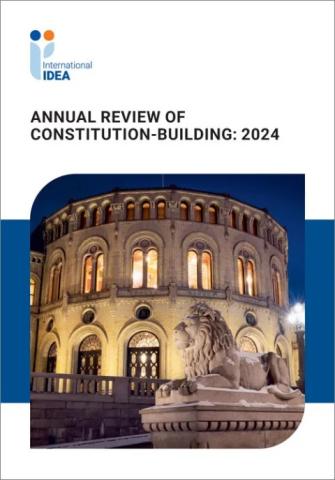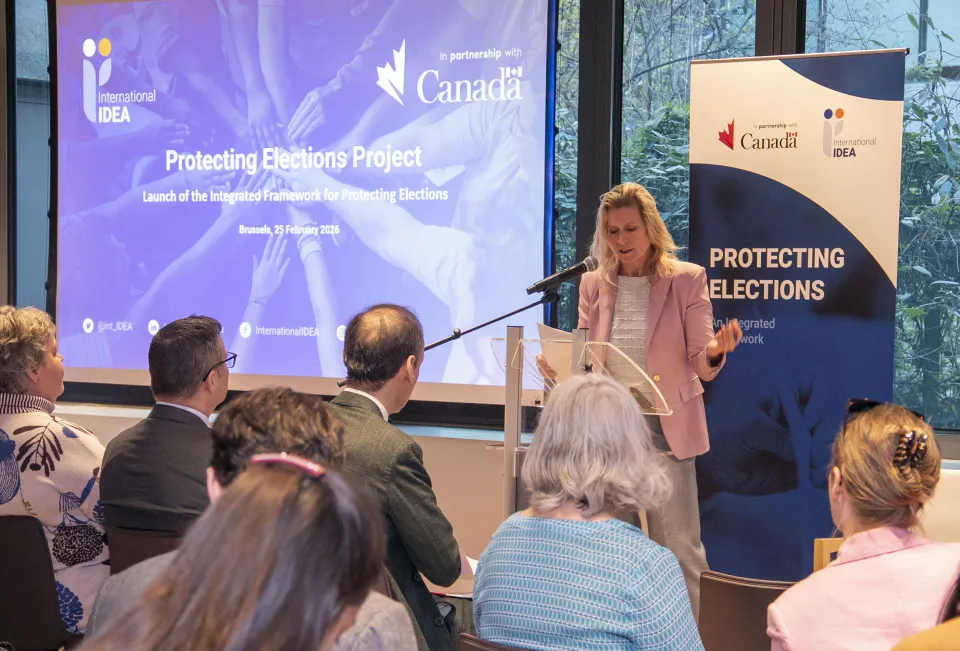
International IDEA’s Annual Review of Constitution-Building 2024: A Decade of Tracking Global Constitutional Change

Since its first publication in 2013, the Annual Review of Constitution-Building has become a trusted global reference on how constitutions evolve, and what that evolution reveals about democracy, governance, and the rule of law around the world. Published by International IDEA, the Review identifies and analyses the major constitutional reform processes of each year, drawing out common trends and lessons that transcend national contexts.
The 2024 Edition: Constitutionalism in a Time of Democratic Strain

The Annual Review of Constitution-Building 2024 offers a comprehensive look at the shifting constitutional landscape of the past year. Against a backdrop of democratic backsliding, eroding checks and balances, and rising authoritarianism, this year’s Review highlights both the challenges and the quiet sources of resilience in constitutional reform.
Covering developments in Barbados, Belarus, Bulgaria, Burkina Faso, Fiji, France, The Gambia, Georgia, Germany, Ghana, Guyana, Jamaica, Moldova, Myanmar, Norway, Poland, Slovakia, South Sudan, and Sweden, the 2024 edition examines how constitutional debates mirror broader political and social transformations. From broad themes such as democratic backsliding to more specific issues like the constitutional place of the prosecution service, the Review reveals how constitutions continue to serve as both instruments of power and hope.
When the series began, democratic constitutional reform was at the forefront of many national agendas. A decade later, the picture has dramatically changed. As the 2024 Review underscores, abusive constitutionalism—the manipulation of legal frameworks to entrench power—has replaced the wave of reform that once sought to expand rights and strengthen accountability. Yet, as some of the chapters in this year’s review show, there are silver linings among the gathering clouds. Efforts to capitalize on these silver linings—whether by democratic actors exiled from power or advocates of gender justice or democratic resilience—continue to need support, and International IDEA is committed to responding to requests for knowledge, assistance and advice wherever possible.
Quotes from the 2024 Review
[R]eviewing the constitutional framework for vulnerabilities based on patterns of democratic backsliding elsewhere is an exercise which should be strongly considered by all, including established democracies."
— Alexandra Oancea & Sumit Bisarya in Chapter 1, "Constitutional resilience: fixing the roof while the sun is shining"
The advancement of gender equality through constitutional reforms within one Commonwealth nation in Africa or the Caribbean carries profound implications for the broader region, potentially serving as a catalyst for similar progress in neighbouring countries."
— Satang Nabaneh in Chapter 2, "Gender and constitutionalism: Barbados and Ghana"
When a political system is built upon winner-takes-all, adversarial, competitive dynamics, it is hard to rise above that to bring about constitutional change in the national interest (…).''
— W. Elliot Bulmer in Chapter 3, "Adversarial politics and constitutional change: Fiji, Guyana and Jamaica"
[A]ssessments of and efforts to improve the resilience of a constitutional and democratic framework should pay particular attention to the constitutional status of the prosecution service and efforts to reform it.''
— Adem Kassie Abebe in Chapter 4, "The constitutional place of the prosecution service, democratic backsliding and resilience"
The surge in rhetoric in opposition to gender equality, abortion and the LGBTQIA+ community across Europe is closely linked with the rise of illiberal politics and right-wing populism.''
— Sharon Pia Hickey in Chapter 5, "Constituting family, gender and the nation: European Union ‘values’ and integration in 2024"
[W]hile the start of the transition is uncertain, writing a constitution that is forward-looking and acknowledges the people’s needs and demands may have an impact beyond the frontiers of the country it is primarily written for.''
— Kimana Zulueta-Fülscher in Chapter 6, "Constitution making in exile"
[E]xtensions to transition periods not only delay a return to democracy but may erode public trust in the government by signalling that the government is not credibly committed to realizing the transition.
— William Underwood in Chapter 7, "Extensions to transitional governments: The uses and limits of their regulation"
About the Series
The Annual Review of Constitution-Building provides policymakers, scholars, and practitioners with a comparative overview of ongoing constitutional processes worldwide. Each edition distils lessons from current reform efforts, highlighting both the risks to democracy and the opportunities for renewal.
Explore past editions of the Annual Review series: 2023; 2022; 2021; 2020




